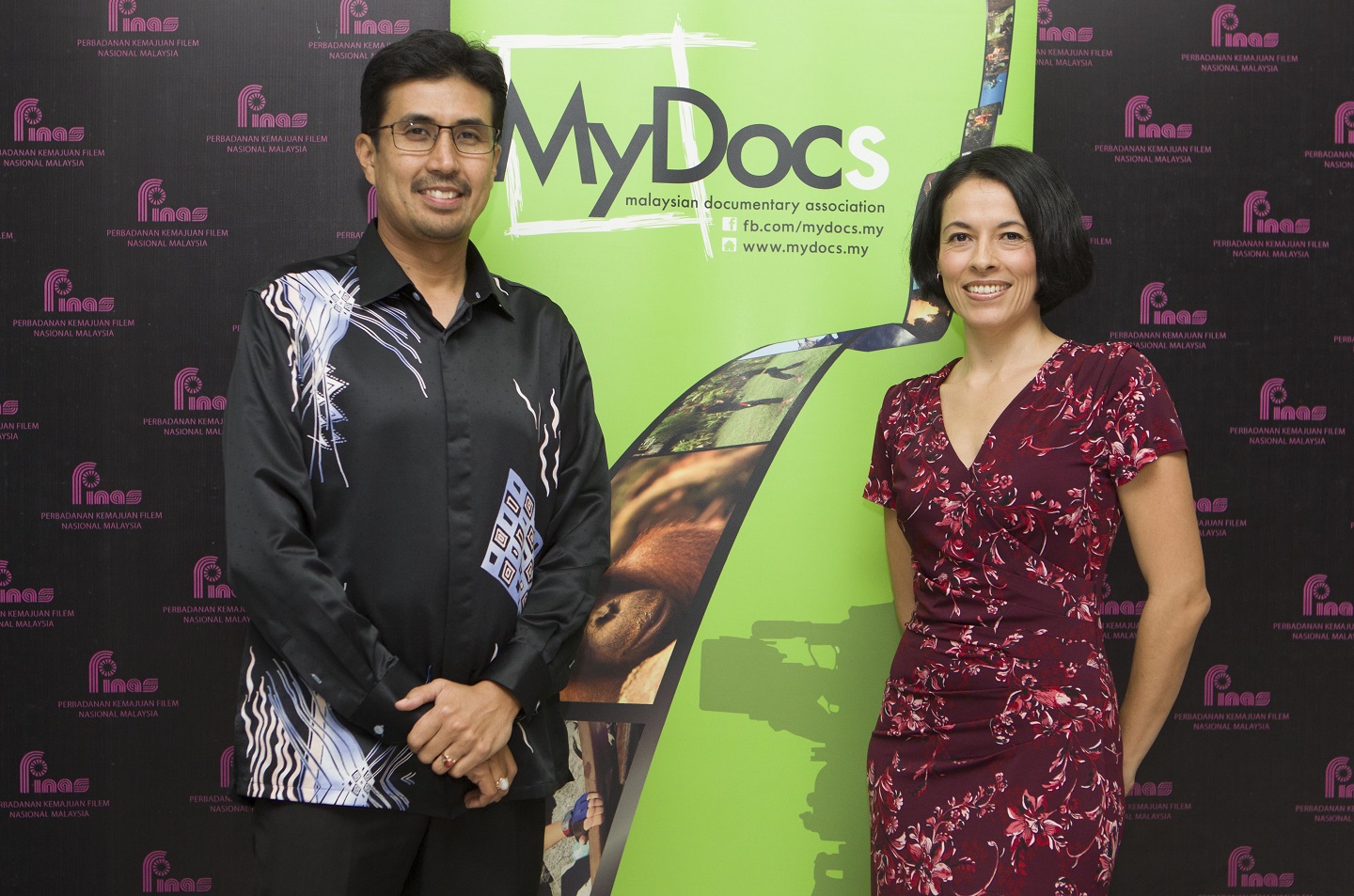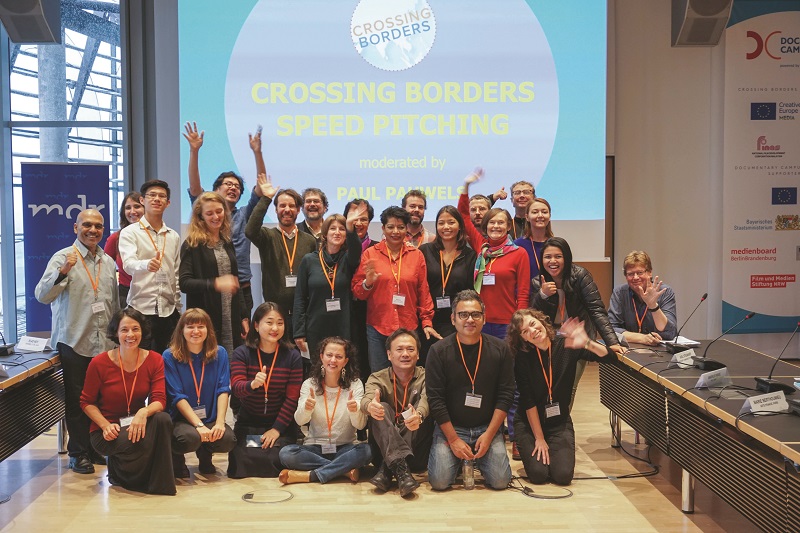
Finas deputy director-general Datuk Azmir Saifuddin Mutalib and Lina Teoh
On the invitation to sit down with some of the players at the forefront of Malaysia’s documentary scene, there was one familiar yet unexpected name — Lina Teoh.
To those within the industry, she is “one of the gang”. But for the majority of the public, she is better known as Miss Malaysia 1998 and the second runner-up at the 48th Miss World pageant as well as a lady with a high-profile career in TV, hosting and modelling.
On a recent sunny morning, an unadorned but still beautiful Teoh met me at the National Film Development Corporation Malaysia (Finas), which as executive director of the Malaysian Documentary Association (MyDocs), makes her a regular visitor. Together, we joined Finas deputy director-general Datuk Azmir Saifuddin Mutalib at his office.
“I know, I can’t run from it,” laughs Teoh at the mention of her glamorous past. She pauses for moment before blurting out,“It’s going to be 20 years next year… Contrary to my background, I’m not a in-the-public-eye kind of person,” she says, clearly exuding a comfortable confidence in her current role.
In fact, by now, the documentary producer and director probably feels more accomplished as a filmmaker than as a pageant winner. Her innate voracious appetite for learning and love for reading non-fiction and biographies helped her choose the path she is now on.
“The thing is, I’ve been in this from the beginning. I am part of the first wave of Malaysian documentary filmmakers who have gone beyond our borders,” Teoh says matter-of-factly.
She was involved in the first two co-productions between National Geographic and Finas, titled Megastructures: Smart Tunnel and Among the Great Apes with Michelle Yeoh, before going on to direct and produce The Lion Dance King for Discovery — another Finas co-production — as part of a first-time filmmakers initiative.
These days, the mother of two has switched to fostering the local documentary-making community under MyDocs, which was started five years ago by a group of like-minded and experienced filmmakers. Her initial decision to run the non-profit organisation for six months has to date turned into a three-year tenure. From having just a handful of attendees in the beginning, MyDocs now consistently sees about 100 people at its monthly workshops, screenings or master classes.
It regularly partners regional documentary platforms, with one of its most successful initiatives being the partnership with Crossing Borders — a training programme for documentary filmmakers in Asia and Europe to cultivate their project ideas and provide them with a platform to pitch them. This year marks the third time that Malaysia has hosted the programme, all through MyDocs.
“We just came back from Leipzig, Germany, where the 14 selected participants — four of them from Malaysia — did their first speed pitching to a panel comprising over 40 of the most influential commissioning editors and buyers from Europe and the US. This week, they will pitch here once again to regional broadcasters and buyers, which is open to the public to come and watch. The whole idea is to bring an exchange of training and exposure from Europe, and on our part, to provide access into the Asian market,” says Teoh, who is a former participant.

She singles out Finas’ role as sponsor for the Asian side of Crossing Borders: “We owe a lot to Finas for proactively promoting the local documentary scene and supporting us. MyDocs really exists to bridge the gap for talent who perhaps have no experience or training in how to survive or thrive in the international arena. Part of that includes working with the agency, which has been really supportive of all our training programmes. The documentary scene would not be what it is today if not for Finas’ support,” Teoh says, quipping that, “I’m not just saying that because I’m sitting in his office.”
Azmir chimes in: “Documentaries are part of the main cluster we look into in developing the creative industry. If you look at the ecosystem, we are involved in every step, from the supply chain of the talent pool itself to working with universities to develop skill sets, making sure that demand and supply are met and, most importantly, networking with buyers and distributors.”
He reveals that the documentary community in Malaysia is relatively successful compared to other sectors of film and TV — particularly when it comes to its reach and gaining of international recognition. Teoh agrees, highlighting that the genre’s universality of topics allow the segment to move beyond borders.
She says the smaller global market for documentaries also make it easier to develop a closer relationship with parties across Asia, Europe, North America and South America.
Still, when it comes to making a mark abroad, there is a lot of educating to be done. “Making a documentary is hard work — I have friends who do both fiction and non-fiction and, hands down, they agree documentaries are more challenging. But even harder at the moment for a lot of producers and filmmakers is to ‘cari makan’. This often has something to do with how things are done here as well,” remarks Teoh.
Both Teoh and Azmir believe that the mindset of local filmmakers has to change for them to be truly ready for the world. MyDocs has laid the groundwork for that over the past few years, with practical workshops on topics such as working with an international budget structure — where every single dollar has to be accounted for and itemised — and how to collaborate with companies such as Discovery or National Geographic.
“When you do a co-production with a company like theirs, there’s a production bible full of rules and regulations and a legal standard that must be adhered to. Here, we don’t have that kind of discipline traditionally, and young filmmakers are not taught that from the get-go,” Teoh points out.
She says what is often overlooked is how good Malaysian filmmakers have it here when it comes to opportunities, compared to, say, European filmmakers. A big part of that has to be credited to Finas, it is reiterated.
“We get local support and funding from Finas, and it often co-commissions productions. That access to broadcast our films internationlly — it’s almost handed to us [on a plate]. All we have to do is do the work, albeit that in itself is really hard. But if you are passionate, you do have opportunities here. I think that’s what a lot of people need to know. They just need to cross that barrier, step up and grasp it. I can tell you, ask filmmakers from abroad and they’ll say we have it made with the opportunities we get,” says Teoh.
Touching on the agency’s often misunderstood — not to mention maligned — position, Azmir says with a smile, “Our role is to facilitate. Some misinterpret that facilitation. They expect Finas to bring them from zero to the next level. But we are not the one that brings you all the way to success. We are here to help fill the gaps on your way.”
Moving forward, he says the strategies employed will focus on boosting the profile of Malaysian documentaries, hopefully culminating in a nomination — and win — at the Emmy Awards within three years. If so, it will follow in the footsteps of a Malaysian TV drama and animated series that have earned nominations in the last decade.
“On the business side, I hope documentaries can grow healthily. I think the efforts between MyDocs and Finas will help put Malaysia out there as a hub for broadcasters. I think we are not just competing within Southeast Asia now, but are looking beyond the regional league,” sums up Azmir. Teoh grins in response, “I feel a lot of pressure now. But I always say, shoot for the top.”
For more information, visit MyDocs and Crossing Borders.


